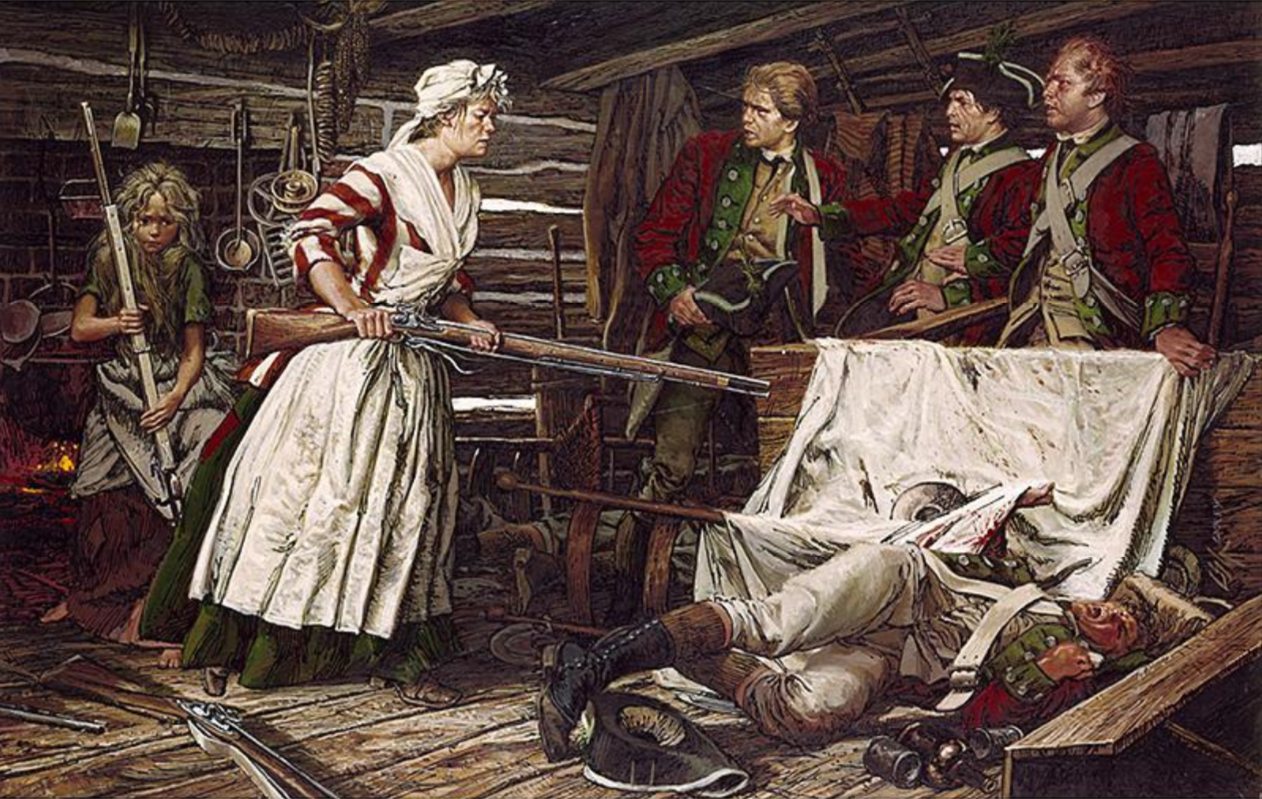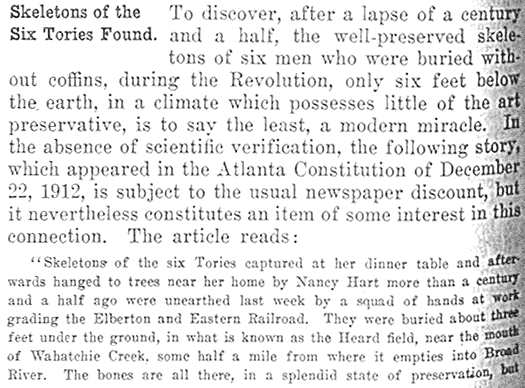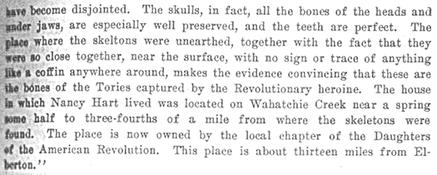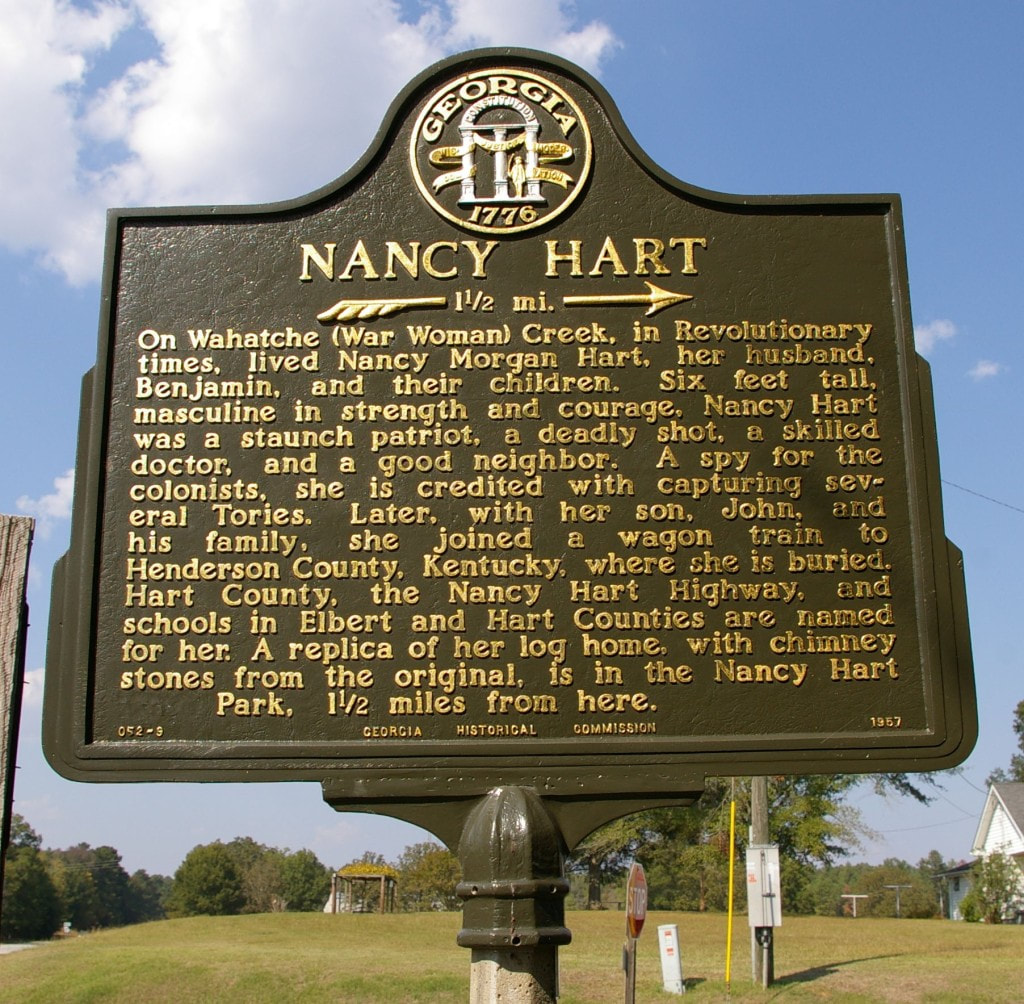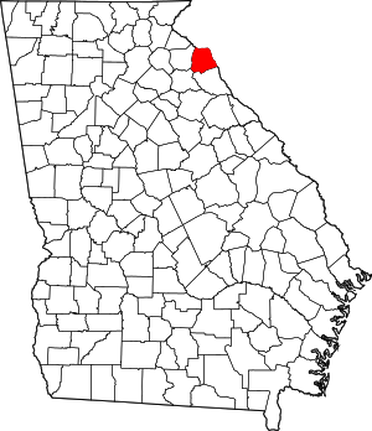Nancy Hart: Larger-than-life Heroine of the Revolution
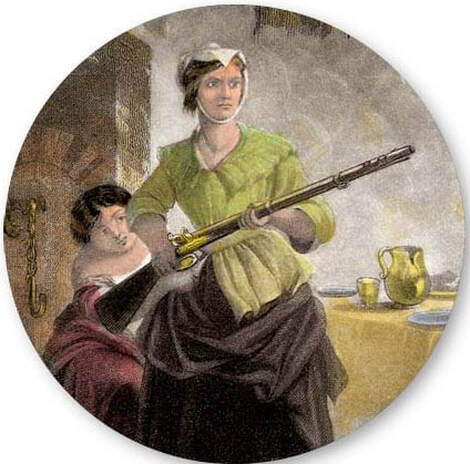
From: Evans, Lawton B. First Lessons in Georgia History. 1913: American Book Company, New York
One of the most remarkable women of the Revolution was Nancy Hart, the wife of a farmer having in a log cabin in Elbert County. She was six feet tall, very muscular, and with a fiery temper. She cordially hated the Tories, and never lost an opportunity to let them know it.
Story of the Hot Soap. — One evening Nancy was at home with her children sitting around a log fire, with a large pot of boiling soap on the fire. She was stirring the soap with a ladle and telling stories of the war. While she was thus employed, one of the family discovered some one peeping through the logs of the cabin, and quietly, by signs, intimated the fact to Nancy. She kept on talking and stirring the hot soap, at the same time keeping a sharp lookout for the eyes of the spy. Suddenly, with the quickness of lightning, she dashed a ladle of the scalding soap through the crack full in the face of the eavesdropper, who, taken by surprise and blinded with pain, screamed and roared at a great rate. Nancy quickly went outside, amused herself at his expense, and bound him fast as a prisoner.
One of the most remarkable women of the Revolution was Nancy Hart, the wife of a farmer having in a log cabin in Elbert County. She was six feet tall, very muscular, and with a fiery temper. She cordially hated the Tories, and never lost an opportunity to let them know it.
Story of the Hot Soap. — One evening Nancy was at home with her children sitting around a log fire, with a large pot of boiling soap on the fire. She was stirring the soap with a ladle and telling stories of the war. While she was thus employed, one of the family discovered some one peeping through the logs of the cabin, and quietly, by signs, intimated the fact to Nancy. She kept on talking and stirring the hot soap, at the same time keeping a sharp lookout for the eyes of the spy. Suddenly, with the quickness of lightning, she dashed a ladle of the scalding soap through the crack full in the face of the eavesdropper, who, taken by surprise and blinded with pain, screamed and roared at a great rate. Nancy quickly went outside, amused herself at his expense, and bound him fast as a prisoner.
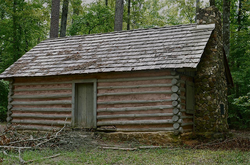
This is a replica of Nancy Hart's cabin using stones from the original cabin. (Elberton, Elbert County)
Nancy Saves a Patriot. — While the Tories were overrunning upper Georgia, Nancy one day heard the tramp of a horse rapidly approaching her cabin. She soon saw a patriot riding for life, and knew that he was pursued by a party of British. She let down the bars a few steps from her cabin, motioned him to enter, and told him to ride through the house, out of the back door, and hide in the swamps as best he could. She then put up the bars, closed the doors of her house and went about her business. In a few minutes some Tories rode up to the house and called out noisily to her. She wrapped up her head and, opening the door a little way, inquired why they disturbed a sick, lone woman. They said they had traced a man near her house, and asked if anybody on horseback had passed that way. "No," replied Nancy, "but I saw a man on a sorrel horse turn into the woods about a hundred yards back." "That must be the fellow," they said, and asking the direction they rode away. "Well fooled," said Nancy. "If they had only looked at the ground instead of at me, they could have seen the hoof-prints of a horse coming to my front door and leading to the swamp in the back."
Nancy and the Tories. — Shortly afterward, the party of Tories who had savagely murdered Colonel Dooly in his bed proceeded up Broad River. A detachment of five or six crossed the river and came to Nancy Hart's cabin. Boldly entering, they demanded food to be cooked and served. Nancy was alone excepting one little girl, her husband and the other members of the family being at work in the field. She replied: " I never feed king's men, if I can help it; the villains have put it out of my power to feed even my own family, by stealing and killing all my poultry and pigs. Nothing is left but that old turkey out there." " Well, and that you shall cook for us," said one of the Tories, and raising his musket he shot the turkey, which another brought into the house and handed to Nancy to clean and cook. She took the turkey and began to prepare it for the meal of the soldiers. She sent her little daughter to the spring for a bucket of water, telling her privately to blow the conch shell which was kept on a stump, to let her husband and the neighbors know there were Tories in the cabin. Nancy soon had the turkey on the fire. The soldiers stacked their guns in one corner of the cabin, began drinking and singing, and were quite merry. The little girl went to the spring, blew the conch shell, and returned with the water. Soon the turkey was ready, and the soldiers sat down to eat with many a jest at the hospitality of Nancy. She was waiting on them, frequently passing between them and their guns stacked in the corner. While the meal was in progress, Nancy seized one of the guns and pointed it at the party. They sprang to their feet in terror, while she swore she would shoot the first man that moved a foot. One of them advanced upon her, and, true to her threat, she fired and he fell dead upon the floor. Seizing another gun she cried out to the girl: "Run! Call your father and the neighbors. Tell them I have caught some base Tories ! " The girl hurried to the spring and blew the conch again. The Tories, in great alarm, started to seize the intrepid woman. She fired again, and another of the men fell wounded. Before the others could escape or capture their arms, Nancy's husband and several of the neighbors rushed in and, seizing the Tories, bound them hand and foot. The men were about to shoot down the prisoners, but Nancy said: ''Stop! they are my prisoners. Shooting is too good for them. They must swing for their crimes." The hint was enough. The dead man was dragged out. The wounded Tory and the other men were taken out to the road, and were soon hanging to a tree. The tree upon which they were hanged was pointed out to passers-by for fifty years afterward, as was also the site of the brave woman's cabin.
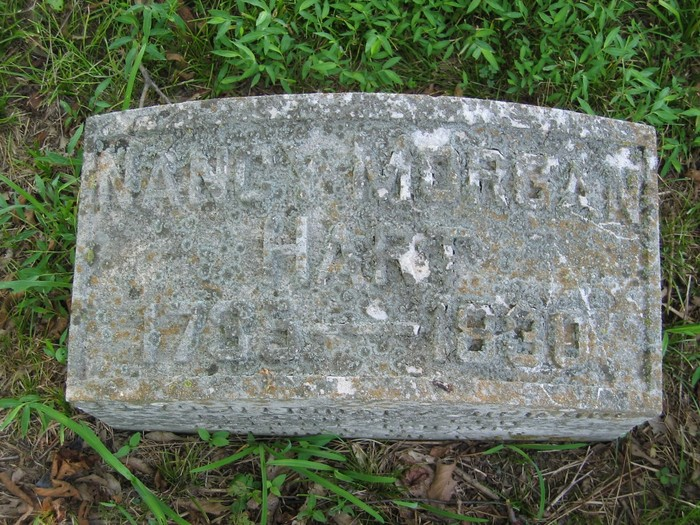
Nancy Hart was a real person, but whether the stories about her are true is not as certain. She and her husband, Benjamin Hart, moved to the Georgia from the Carolinas in the early 1770s, living in the ceded Indian lands of what later became Wilkes County. The murder of Colonel John Dooly by Tories would have occurred in 1780 while the Harts lived in Wilkes County.
After 1790, the Harts lived in Elbert County. By 1796, they had moved to Glynn County where Benjamin served as a justice of the peace and then as a justice of the inferior court. When he died in 1801, Nancy joined her oldest son, John, in Clarke County. They later moved to Henderson County, Kentucky, where the date of her death is given as 1830, although no proof exists.
Although there are reports of her exploits as early as 1825, the first account on record of her war heroics appeared in 1848. As Nancy’s story spread, her fame grew. Illustrations of her began to appear in the 1850s. The story of Nancy Hart and the Tories grew more elaborate. In 1853, the state legislature created Hart County, named for Nancy, out of Elbert County. Today the state operates Hart State Park where, in 1931, a historical marker was placed where the spot where she reputedly lived.
After 1790, the Harts lived in Elbert County. By 1796, they had moved to Glynn County where Benjamin served as a justice of the peace and then as a justice of the inferior court. When he died in 1801, Nancy joined her oldest son, John, in Clarke County. They later moved to Henderson County, Kentucky, where the date of her death is given as 1830, although no proof exists.
Although there are reports of her exploits as early as 1825, the first account on record of her war heroics appeared in 1848. As Nancy’s story spread, her fame grew. Illustrations of her began to appear in the 1850s. The story of Nancy Hart and the Tories grew more elaborate. In 1853, the state legislature created Hart County, named for Nancy, out of Elbert County. Today the state operates Hart State Park where, in 1931, a historical marker was placed where the spot where she reputedly lived.
